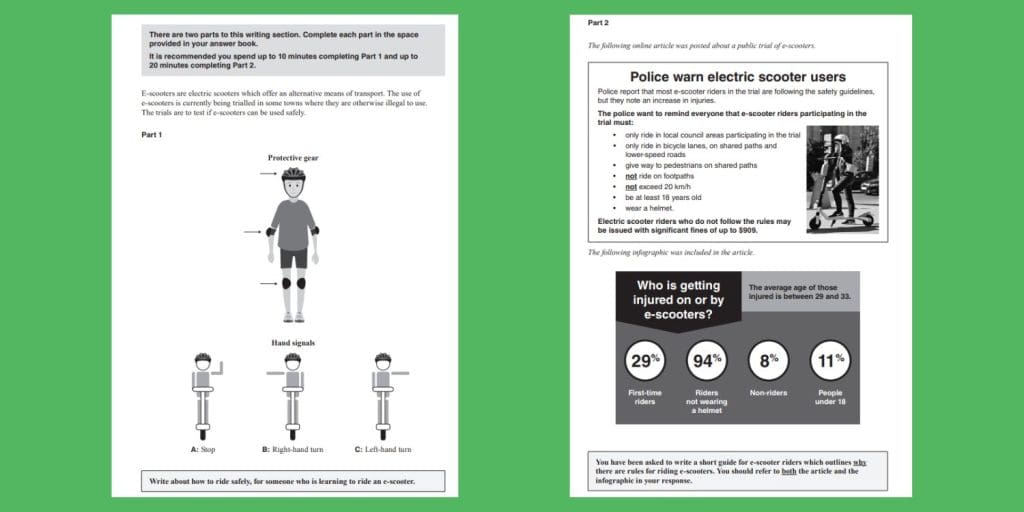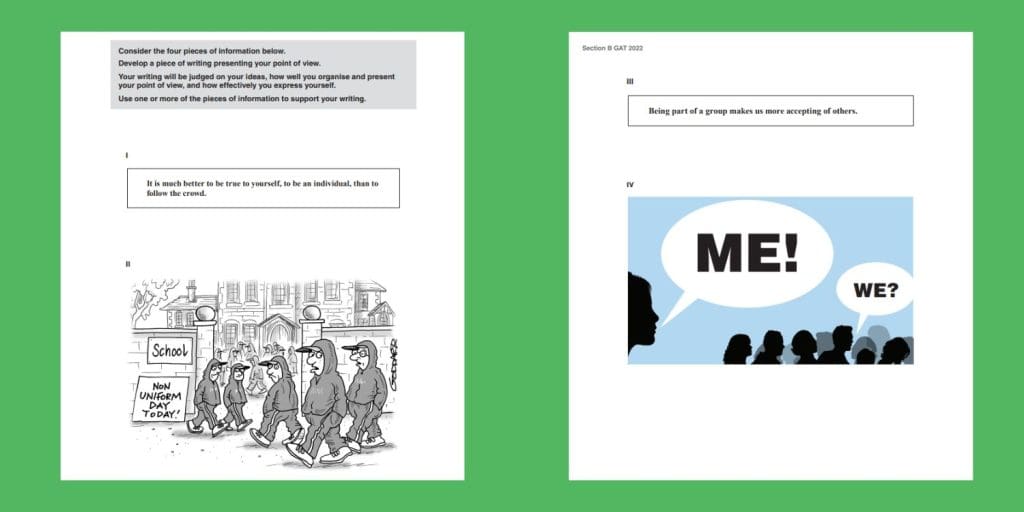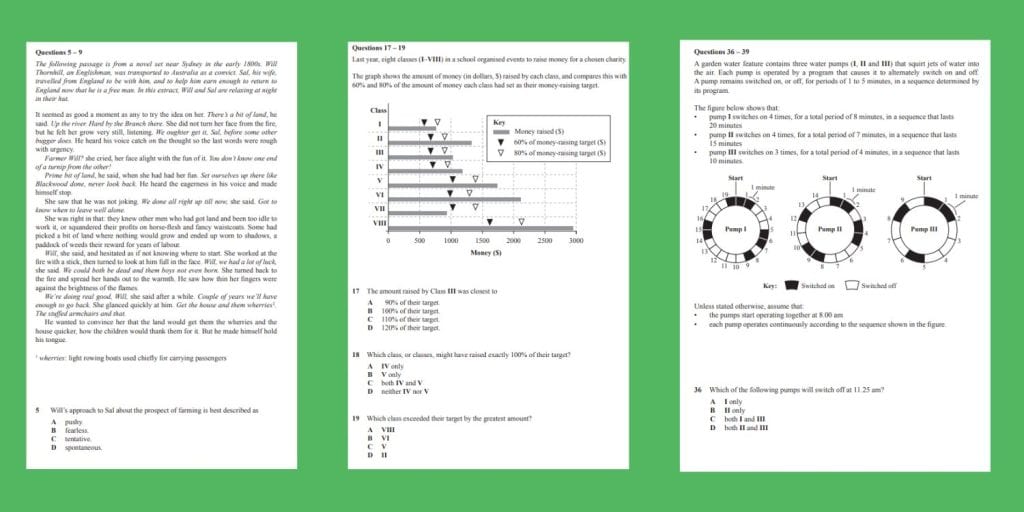I understand, the GAT (General Achievement Test) is a pain. It’s extremely long, tiring and occurs at a time where you already have enough on your plate.
However, I’ll never forget what my teacher told me before I took it: “You don’t need it until you do”.
Despite all the annoyances of the GAT, it is still a vital safety procedure to ensure – no matter what happens – that you get an ATAR that is properly representative of your work throughout the year.
Let me show you why!
What is the GAT and when is it held?
Why do we have the GAT?
What does the GAT look like?
How do you prepare?
What is the GAT and when is it held?
The GAT is simply a general knowledge, skills and common sense test, involving subjects like literacy, numeracy, humanities and the sciences.
In 2024, the GAT will be held on Tuesday 18th June. The testing day will be structured as follows:
- Section A taking place between 9:00am – 11:15am
- Section B taking place between from 1:15pm – 3:00pm
- Both sections begin with 15 minutes of reading time.
Why do we have the GAT?
The General Achievement Test is used for four highly important reasons:
- Can assist the statistical moderation process.
- Quality assurance of VCE assessments.
- Provides students an opportunity to show they meet Victorian numeracy and literacy standards.
- Used in the calculation of derived examination scores.
What does the GAT have to do with VCAA’s statistical moderation process?
During VCAA’s statistical moderation process, GAT scores can be used in conjunction with school-based assessment scores.
However, this will only be done if they provide an effective match with school-based assessments across the state. Meaning, if the external exams are for whatever reason, not doing their job, the GAT is a back-up plan.
Don’t worry though, this only applies to extreme circumstances. The statistical moderation process will always have the biggest influence in the statistical moderation process.
Want more information on how VCAA calculates study scores? Read our article on the 2024 VCE Scaling Report!
What does the GAT have to do with quality assurance of VCE assessments?
VCAA essentially uses the GAT as a ‘final check’ on external assessment scores. The check is called ‘anomalous grading marking’.
If there is a significant difference between the final score for an external assessment, the score predicted by the GAT, and school indicative grades, the external assessment will be assessed again.
Scores may go up or stay the same as a result. Although, they cannot go down.
What is a derived examination score?
A derived examination score (DES) is a study score calculated when a student who is ill or affected by personal circumstances during VCE external assessment, leading their results to be an inaccurate or misrepresentation of their learning and achievement.
For example, if you miss an external assessment because you have to go to the hospital in an emergency, you will get a DES.
VCAA will use moderated school-based assessments, the General Achievement Test, other external assessments and indicative grades from school to calculate the DES.
So, does the GAT affect my ATAR?
Yes, it can.
If you miss your final exam for a subject – for a justifiable reason – the GAT will play a part in VCAA calculating your final study score for that subject.
If your final exam fails to properly distributed students, the General Achievement Test will play a part in creating the final study scores.
You never know if you’ll need the GAT. Some of my friends did, some of my students did too. You could very well need it as well.
I hope you’re starting to see how important the GAT really is.
What does the GAT look like?
Remember NAPLAN? Well, the GATs not too far off. It contains two sections that you’ll complete over the course of one day.
Section A: Literacy and Numeracy Skills – 120 minutes
- A two-part writing task.
- 50 numeracy multiple choice questions.
- 50 reading multiple choice questions.
Section B: General Knowledge and Skills – 90 minutes
- An extended writing task.
- 25 mathematics, science and technology multiple-choice questions.
- 25 arts and humanities multiple-choice questions.
The GAT lasts for 3.5 hours. The two sections are split so you don’t have to do it all in one sitting! However, the time constraints are pretty strict, so you’ll have to be quick.
Section A – Two-Part writing task
The two-part writing task extracted from VCAA
Above is what the two-part writing task from the GAT looks like. The two part writing task will always have a similar format, but can ask you to do an extremely broad range of tasks.
The above example asks you to write about riding safely and why their are riding rules for e-scooters. In the past you have had to summarise a page full of materials or develop a point of view.
What matters is that you clearly complete the objective and do so with clear, succinct writing and appropriate grammar!
Section B – Extended Writing Task
The extended writing task extracted from VCAA
Once again it is really important to acknowledge just how much the writing tasks can vary. You will very likely be given writing tasks in your GAT that look nothing like this.
However, a common feature in the GAT is a writing task that requires you to use multiple sources. So you can generally expect a writing task like this in your General Achievement Test too.
Regardless, it is important to follow the instructions as carefully as possible.
Multiple Choice Questions
Multiple choice questions extracted from VCAA
Just like the writing tasks, the multiple choice questions vary significantly. They don’t get too difficult, the hardest part is interpreting the given scenario and properly reading the question.
Keep in mind that the questions will be related to various subjects. So they’ll relate to science, maths, humanities, english and so on.
Tip: Since there are maths components, bring your calculator!
How do you prepare?
Every year, students are not sure how to properly prepare for the GAT. They stress over how many practice papers they should do or whether they should study at all.
Therefore, here are my tips for preparing for the GAT:
- Practice
- Rest and recuperate
Practice the conditions
Firstly, the key to doing well in the GAT is being familiar with the conditions and format, just like any other exam or test.
I would recommend only doing one practice GAT. But I would recommend doing it under proper conditions, replicating the exact same conditions of the GAT.
Usually, your school will do this for you. So if they do, there is no need to do anymore practice!
While you do this, make sure to give it your best shot and do it properly. Treat it like an external assessment for one of your subjects.
Every practice and past GAT has recommended solutions, so I would also suggest you mark your practice GAT appropriately so you know where you have to focus in the real thing!
Need help balancing your work load? Read our guide to managing VCE!
Rest and recuperate
The GAT is on the 18th of June, near the end of Term 2. This is a really busy time for all VCE students. You will be halfway through Unit 4, completing SACs, and maybe even beginning your exam preparation.
Resultantly, the GAT can be really exhausting.
So, I really recommend that you take some time off — before and after the GAT — to ensure you don’t burn yourself out. Remember, the VCE is a marathon not a sprint.
Personally, I took the day before off, and did not study on the day of the GAT. This worked really well for me. You can do what you want, but just make sure to take a rest and look after yourself!
Starting to think about external assessments? Here is how to study for your VCE exams!
That’s it!
Hopefully it is now clear why VCAA has the General Achievement Test, not to make your life harder, but actually to make it far easier. Furthermore, I hope you realise that the GAT isn’t actually that bad. Afterall, it’s only 3.5 hours.
Now, make sure not to overcomplicate or study too much for it. Just do a tiny bit of practice and do the best you can. That’s the best way to do it!
P.S. don’t do the GATchphrase, you’re just asking to lose marks.
Are you looking for some extra help with your VCE journey?
We have an incredible team of VCE tutors and mentors!
We can help you master your VCE subject study designs and ace your upcoming VCE assessments with personalised lessons conducted one-on-one in your home or online!
We’ve supported over 8,000 students over the last 11 years, and on average our students score mark improvements of over 20%!
To find out more and get started with an inspirational VCE tutor and mentor, get in touch today or give us a ring on 1300 267 888!
Max Huyton is the VIC Growth Marketer for Art of Smart and a Laws and Commerce student at Monash University. In his other life, Max spends his time reading and writing whenever he gets the chance and cooking extremely mediocre dishes for friends and family.





